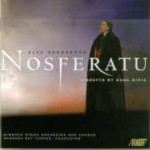Nosferatu, based on Murnau’s 1922 film, has been in the works for many years and was finally premiered doubly at the Rimrock Opera Company in Billings, Montana and Opera Idaho in 1994. What the two companies have in common is the artistic directorship of Douglas Nagel, who also sang the title role. Dana Gioia, who wrote the poetic libretto for this opera, is a well-known poet, the winner of the National Book Award, and the Chairman of the National Endowment for the Arts. Alva Henderson, the composer, has penned Medea, performed by the San Diego Opera in 1972, The Last of the Mohicans, which premiered in Delaware in 1976 and was subsequently given at the Lake George Opera Festival and broadcast on NPR, West of Washington Square, heard in San José in 1988, and various choral works, which have been presented in cities across the United States.
The opera in two acts lasts for two-and-a-half hours, and while much of it is fine to listen to, it could use some paring. The plot is clearly organized. In a Baltic seaport, Heinrich Skuller, a businessman, offers young Eric Cutter a job: he is to travel to Hungary and sell a property to the mysterious Count Orlock. Cutter’s wife, Ellen, slightly crazy and delusional, is left behind. Eric meets the Count at his spooky castle, and the Count “seduces” Eric–he gets to drink his blood, but he spares his life when he sees an image of Ellen. Skuller, it seems, is Orlock/Dracula’s servant and agent, and in Act 2 he tells Ellen that she now belongs to him. Dracula arrives by ship, bringing plague-infested rats that ravage the town. Eric has returned and is insane. Skuller tells Ellen the secret of destroying Dracula: expose him to sunlight. Ellen flirts with the Count long enough to do so, and as she dies, so does Dracula.
The music is tonal and handsome. Most listeners will find it cinematic–it is reminiscent of 1940s black-and-white films with sweeping orchestral scores. And that music, of course, was born of the last gasps of the Romantic movement in Germany and Austria. It is derivative in a respectable way, and the vocal lines are taken from 19th century opera. There are set pieces–arias, duets, etc.–and many end on climactic high notes, both expected and familiar. These are not criticisms so much as observations, but avant gardists be warned–there is nothing here to tingle the intellect or challenge any precepts.
Douglas Nagel sings Nosferatu with a large, unresonant tone, articulating each word clearly, aiming for melodrama and succeeding at finding it. Robert McPherson, a true lyric tenor with a sharply focused tone, is impressive as Eric, by turns curious, frightened, bewildered. The pivotal role of Ellen is taken by soprano Susan Gundunas–it is she who must confront our Vampire and who eventually brings him down–and while she seems to be a fine singing actress, I assume she was vocally under the weather at the live tapings from which this recording is taken: she’s often shrill and off-pitch. The provincial orchestra does well, barring a few splattered brass outbursts, and the rest of the cast members successfully manage their respective assignments.
































